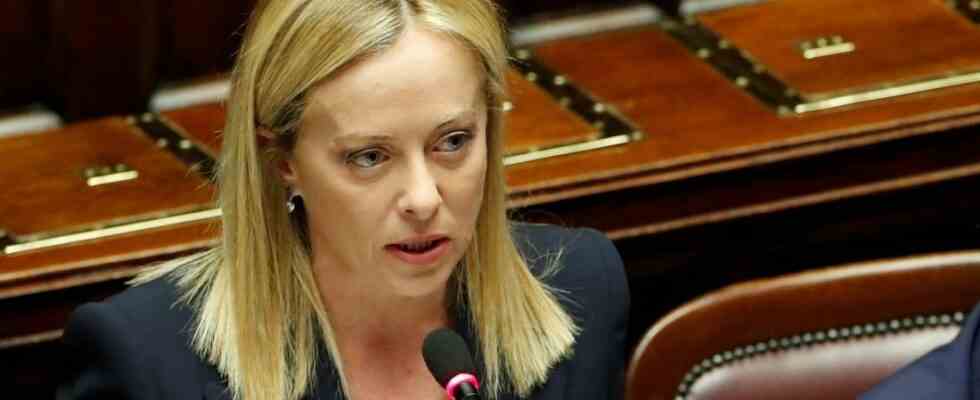The new Prime Minister, or as it is correctly called in Italy: the President of the Council of Ministers of the Italian Republic, speaks for about 70 minutes. Giorgia Meloni would already reject this salutation. She has announced that she will use the masculine form in official communications, ie President of the Council of Ministers.
Meloni, 45, is the first woman to head an Italian government. At the beginning of her speech, she briefly mentions that, along with all the other challenges, it is “one of the burdens that she feels on her shoulders”. And thank you – that may sound a bit more solemn in the German translation than it actually sounds in Italian – “those women who built the stairs on which I can break through the glass ceiling”. However, the new prime minister has already made it clear that she is anything but a feminist, and from the feminists’ point of view the issue of address is probably the smallest problem.
Meloni, the head of the far-right Fratelli d’Italia, was defended by President Sergio Mattarella at the weekend and took over from her predecessor Mario Draghi. She also had a first appointment on Sunday, an informal meeting with French President Emmanuel Macron, who was in Rome because he had an audience with Pope Francis. Meloni and Macron spoke about the war in Ukraine and the energy crisis. Arrived in the circle of EU governments – the signal that went out from the meeting should have pleased Meloni.
However, there was some irritation on Twitter about congratulations from EU Commission President Ursula von der Leyen and Chancellor Olaf Scholz. Too little critical distance, too friendly a dealing with a fascist, many complained. In fact, it is striking how comparatively mild politicians in the EU meet Meloni, at least if you think back to what was going on in around 2000, when the right-wing populist FPÖ came to power in Austria and cut the government in Vienna for months was supported by the other EU partners. Maybe times were different then, maybe this time the EU is too exhausted to add a right-wing government in Italy to the list of unsolved problems alongside the war and all the other major crises. It might even be a conscious strategy to face Meloni matter-of-factly in order to disenchant her.
In any case, the government statement before Parliament is an opportunity for Meloni to make the world understand what she has long maintained: nobody need be afraid of the Fratelli d’Italia. We stand for continuity and reliability, in the EU, in NATO and in general.
Every few minutes she speaks louder and more emotionally
In fact, Meloni touches on all areas of politics in the 70 minutes. She talks about how she wants to bring Italy’s economy back to growth, she assures her solidarity with Ukraine, emphasizes the value of the family, explains that she wants to prevent the arrival of refugee boats in Italy, laments the neglect of Italian youth, rattles in fast Pace numbers down as she outlines the European Central Bank’s actions to fight inflation. Most of the time she is calm, concentrated and reads the text of her speech off the paper. Only rarely, maybe every few minutes, does she speak more forcefully, louder, and more emotionally.
Everything about Meloni’s speech says: My government wants to do serious work. Her government will rule for the full five years and she represents the “real will of the people”. Many voters had the feeling that their vote counted for nothing because decisions were made “in exclusive circles” anyway. This “Italian anomaly” will be ended. The people have deliberately opted for a “centre-right government” and this wish should be respected.
Italy is firmly anchored in the Western community and will remain so in the future, emphasizes Meloni. Fears that the country could follow a path similar to Hungary under Orbán countered the new head of government by saying that the EU would “not be sabotage, but rather help to develop it further so that it becomes more effective in dealing with all the current crises”. She will abide by all the rules, but let Italy’s voice be heard “within the European institutions, just as it should be for a founding country of the EU.” For example, her government will make proposals “to change those rules that didn’t work,” such as reforming the Stability and Growth Pact, which encourages EU countries to exercise budgetary discipline.
The goal of reducing the country’s debt cannot be achieved with the “blind austerity policy that has been imposed on the country in recent years”. The only way to do this is “permanent and structural growth,” according to Meloni. Your government will pursue a pragmatic economic policy without “financial adventures”. However, a recession is looming in the coming year. The new government will try to mitigate this, for example through state aid for families and companies suffering from high energy prices. “We are in the middle of a storm, on a ship that is damaged in several places. And the Italians have given us the task of guiding this ship into port and making this difficult crossing and guiding the ship into port” says Meloni.
Two votes are still ahead of the new prime minister. One in the Chamber of Deputies on Tuesday evening, another on Wednesday in the Senate, the second chamber of the Italian Parliament. Unless something extraordinary happens, and the British are currently more responsible for extraordinary things, Meloni will win both votes.

